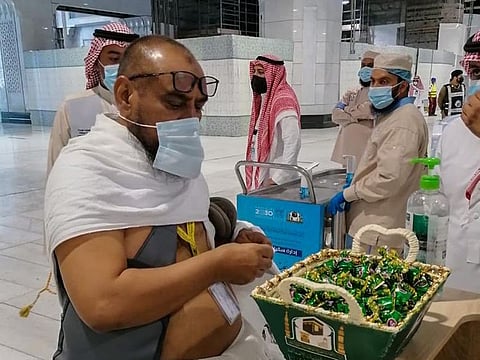Hajj 2021: Pilgrims get sweet, incensed welcome
‘Joy in Grand Mosque today is twice: one marking Eid and other pilgrims’ arrival’

Cairo: Keen to make the Hajj pilgrimage rituals run as smooth and healthy as possible, Saudi authorities have not only utilised high technology to protect pilgrims’ health, but have also treated them literarily to a sweet welcome.
Pilgrims arriving today in the Grand Mosque in Mecca to encircle the Holy Kaaba as part of the Hajj rituals were offered sweets, incense and coffee, a gesture marking also the start of the Muslim Eid Al Adha.
“This initiative was launched to celebrate jubilation of the Eid and the pilgrims’ arrival at the Grand Mosque to perform the circumambulation ritual,” said Janadi bin Ali, the head of the Social Services Directorate at the General Presidency for Affairs of the Two Holy Mosques.
“Joy in the Grand Mosque today is twice: one marking the Eid and the other the pilgrims’ arrival,” he added.
Pilgrims in Saudi Arabia today returned to the Grand Mosque to perform circumambulation of the Holy Kaaba after carrying out symbolic stoning of the devil in Mina, about 7 kilometres from Mecca.
Hajj, one of Islam’s five pillars, is a must for all Muslims to perform at least once in a lifetime if they can financially and physically afford it.
Around 60,000 Saudi and foreign Muslims residing in the kingdom representing 150 countries have been picked to perform this year’s Hajj amid stringent measures against COVID-19.
Eligible pilgrims must be fully vaccinated against COVID-19, free of chronic diseases and aged between 18 to 65 years.
Sign up for the Daily Briefing
Get the latest news and updates straight to your inbox









